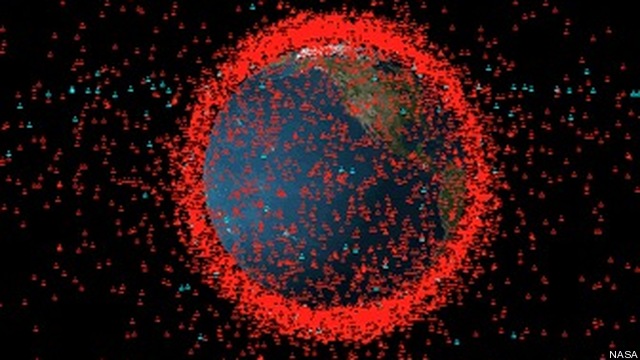China Reaches Out To US For Space Data: Air Force Space Commander
Posted on
 UPDATED: Heritage’s Dean Cheng Says US May Gain Insight Into PRC Space Organizations
UPDATED: Heritage’s Dean Cheng Says US May Gain Insight Into PRC Space Organizations
WASHINGTON: China has taken the unprecedented step of asking Air Force Space Command to share information about possible satellite and satellite debris collisions. The United States had been sharing so-called conjunction warnings with China through the State Department, but no one knew if China actually paid any attention because the data was never acknowledged.
Then, quite recently, the head of Air Force Space Command, Gen. John Hyten, got a formal request from the Chinese to share the information directly. “The Chinese have asked to get data straight from our operations center to their operations center without going through State,” Hyten said during a Capitol Hill breakfast. How significant is this, I asked after we ate. “To me, it’s a big deal.”
I understand that China had committed to this in July as part of the U.S.-China Strategic and Economic Dialogue. The summary document about the agreement between the two countries says the Chinese Ministry of Foreign Affairs “committed to provide e-mail contact information for appropriate Chinese entities responsible for spacecraft operations and conjunction assessment, allowing these entities to receive Close Approach Notifications directly from the United States Department of Defense.“
Of course, getting the PRC’s Ministry of Foreign Affairs to get the People’s Liberation Army to do something doesn’t always happen quickly — if at all. Observers of the fallout after the Chinese anti-satellite test will remember that Foreign Affairs appeared absolutely clueless about the test, both publicly and privately. And that anti-satellite test, ironically, was responsible for an enormous increase in the amount of space debris that may cause a collision. That the United States will play the responsible global citizen and provide conjunction data to the Chinese after the test only deepens the irony.
Of course, for the Chinese it’s a win as the US catalogue and tracking of orbital data is considered the best there is and they are getting direct access to it should any of their satellites be threatened. But this also provides proof to the Chinese that playing by international rules and norms can provide tangible benefits, which surely played a key role in the sharing being approved. Several attendees at the space breakfast said the Chinese request marked an important step forward in US-Chinese military-to-military relations and welcomed it.
One of the foremost US authorities on the Chinese military’s space efforts says in an email that the Chinese move demonstrates “first and foremost, that in the Chinese system the Ministry of Foreign Affairs is NOT a powerful entity. This is reflected in the basic reality that the Foreign Minister has not been a member of the Politburo since the days of Qian Qichen, in the late 1990s.”
He believes that the PLA “is most likely acting, in the first place, to remove an unnecessary link in the chain of information, especially important since conjunction data is perishable.
“Given China’s steadily improving space situational awareness system, my own guess is that they are accessing this data, first, to minimize the chances of a conjunction. There have been some interesting stories in the Chinese press about moving satellites to avoid collisions. It is unclear what data has been used to make that determination, whether it is primarily home-grown, from the US, from third parties, or a combination. Second, it may be to double-check their own data: What are the Americans seeing that we are not? This may be partly a matter of resolution, and partly a possible source of intelligence. There was a brouhaha a few years back where we were reporting in our space catalogs European satellites that the Europeans denied existed.”
So what does America get out of this? “For the United States,” Cheng writes, “ideally this would be an opportunity for us to gain insight into what organizations play a role in China’s space situational awareness organization. Who gets this data (almost certainly the General Armaments Department)? Who else outside the military gets this data? How does it get incorporated into China’s SSA system? In particular, does the China National Space Administration (CNSA) get this data, and at what point? (I doubt the information is going from us to CNSA).”
In the end, Cheng assesses this is not the beginning of a fundamental change to US-Chinese military to military relations. “What WON’T change is that Chinese space (and military, but I repeat myself) officials will NOT engage in direct, US-PRC communications. Certainly not in a crisis, and probably only minimally in peacetime, even with this new connection.”
Subscribe to our newsletter
Promotions, new products and sales. Directly to your inbox.

